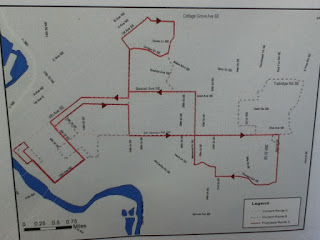 |
| Bike to Work Week celebration crowds the bike lane on 3rd St SE |
In 2019 my town of Cedar Rapids joined AARP's network of Age Friendly States and Communities, which that organization defines as "a framework for state and and local leaders that make communities more livable for people of all ages."
Age-friendly communities make it easy for people to live their best lives at every age. They offer diverse housing and transportation choices, safe and accessible public spaces, and ways for people of all ages and abilities to participate in their community.
They urge localities to think in terms of eight domains of livability: (1) outdoor spaces and buildings, (2) transportation, (3) housing, (4) social participation, (5) respect and social inclusion, (6) work and civic engagement, (7) communication and information, and (8) community and health services. A recent citywide survey, part of the Age-Friendly Community process, asked us to rank these in order of urgency. I chose housing, in part because everything else is way more difficult if housing is uncertain. I also prioritized places to go (#1 and #6), ways to get there (#2), and the ability to participate (#5).
The AARP's effort is similarly-themed to 8 80 Cities, a Toronto-based organization founded in 2007 by Guillermo "Gil" Penalosa. The numbers in their name refer to age: We believe if everything we do in our public spaces is great for an 8 year old and an 80 year old, then it will be great for all people. Their main foci of their mission are "mobility and public space." The range of the projects covered on their website is fascinating:
- My City Too, advocating "a more child friendly Toronto" by enabling "outdoor free play and independent mobility"
- Creating Parks and Public Spaces for People of All Ages, a step-by-step guide to inclusiveness on a budget, in which they partnered with AARP
- Addressing Homelessness in Parks, another collaboration with AARP, a guide to making parks inclusive of all, even the unhoused (see also Owens 2021)
- Wintermission, a toolkit to get communities through the winter together, including these flashcards to facilitate public discussion
And that's just a sampling. And when the city's Age Friendly City survey asked for where our city had done well and where it needed to do more, it was the 8-80 concept that guided me as I answered off the top of my head. I am 62, but have aspirations to be 80, as well as strong hopes that our young people can explore their world independently and safely.
Where has the community done well?
We have an impressive array of parks, from neighborhood pocket parks like Tomahawk...
to multi-acre multi-use parks like Bever where you can swing on a swing, pet the farm animals and quack at the ducks, smell the flowers, have a picnic, hear the municipal band, and/or hike in the woods.
We have bike lanes on key streets, having managed a transition from do-the-best-you-can to painted lanes to separated lanes in congested areas.
 | |
| Protected bike lane on 3rd Avenue SE (from city website) |
We have more sidewalks and trails than ever. This sidewalk on K Avenue NE serves as both an extension of the CeMar trail and a safe route to walk to Garfield Elementary School and Franklin Middle School.
Sidewalks are critical for walking in neighborhoods, whatever shape you're in and whatever speed you go, and it's sad that so many people still resist them.
How can the community become more "age-friendly?"
We could make it easier to get around by slowing car traffic so that it's safer to walk and cycle.
 |
| Why is it so hard to walk to the 1st Avenue Hy-Vee? |
We need more affordable housing options for families and seniors in walkable neighborhoods.
 |
| Missing middle housing on Grande Avenue SE |
Snow removal needs to include pedestrian access to the streets. This is difficult, because we have so large a street network that it's all they can do for workers to keep those clear, but not everybody drives.
 |
| Wall between sidewalk and street along 2nd Avenue SE |
Transit that is affordable and convenient helps people who aren't or shouldn't be driving. We made some modest moves towards more emphasis on human ridership (as opposed to geographic coverage) when we started running buses up 1st Avenue East every 15 minutes. We can't do this for the entire city, but we should explore more opportunities to provide frequent service along direct routes.
 |
| Route #2 covers the southeast side |
Entrepreneurship isn't the answer to everything, but I'd say policy preference for local businesses would lead to more options (entertainment, dining, employment, shopping) for people of all ages and incomes.
Our city, like all places, will face many challenges and opportunities in the future, and it's understandable to focus on each in isolation from the others. But having signed on to Age-Friendly Communities in addition to Blue Zones, and having produced a climate action plan, we are ready with principles to guide our policy decisions.
SEE ALSO: "Out of the Mouths of Babes," 23 April 2019






No comments:
Post a Comment